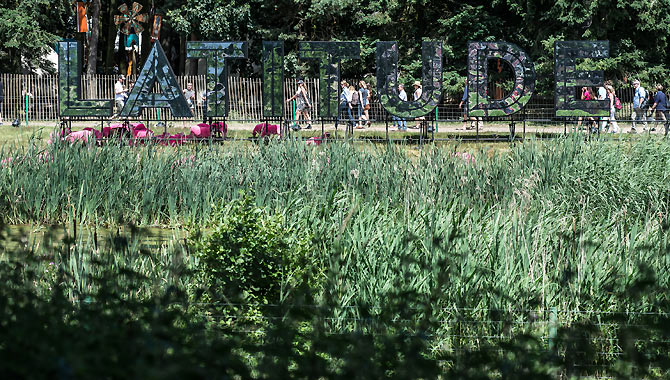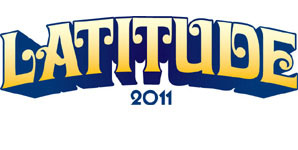Having celebrated its 10th anniversary last year and now embarking on its second decade of existence, Latitude Festival continues to go from strength to strength, reinforcing its status as the ‘biggest small festival’ in Britain. Unlike all of the country’s major festivals (Glasto, Reading & Leeds, T In The Park) the vibe at Suffolk’s Henham Park is very much more chilled, family-friendly… middle class, in short. Wine-tasting, poetry and experimental theatre comfortably exists alongside bands, stage-diving and the more traditional festival pursuits. Facilities are cleaner, queues for everything are shorter and more organised, stewards actually know the answers to questions you ask, and there’s even a “charity concierge” system in place, where you can pay £5 to somebody in a purple uniform to queue for drinks on your behalf.

Then again, with 25,000 people in attendance max, Latitude is a small enough scale on which such organisation can actually work effectively. The pleasures of which were underscored by some glorious weather and a total absence of mud (yay!). The merest hint of rain on Friday evening soon gave way to the breaking heat wave that Britain had basked in and sweated through this last week. Granted, this transformed our tent into a blast furnace by 8am and made sleeping off hangovers all but impossible, but the energy saved by not having to trudge through glue-like mud for hours off-set that.
In terms of the bands it attracts, Latitude has long been able to punch well above its weight, memorably landing the iconic German electronic pioneers Kraftwerk three years ago. But it’s really on the smaller stages that Latitude succeeds, targeting the kinds of bands from North America and Europe that don’t often play in the UK and who normally get column inches in the likes of Pitchfork and other left-field publications.
2016’s 11th edition is no different: Detroit’s post-punk adventurers Protomartyr are really great example of this, the group’s critically lauded 2015 record The Agent Intellect ranking highly in end-of-year lists and then getting exposure in Britain at Latitude. From my point of view as an indie enthusiast, no other British festival quite manages to strike this balance between established names, shrewd gambles on headliners and newcomers. Perfume Genius, Courtney Barnett, Beirut, Weaves and Chet Faker are other notable manifestations of this policy, and all put in highly enjoyable performance to which the crowds responded well.
Key musical triumphs of the weekend were France’s Christine and the Queens, led by its irrepressible and flamboyant leader Heloise Letissier, who received a huge standing ovation for their set at the festival’s second-biggest arena, the BBC Radio 6Music Stage. On the evidence of their reception and the large amount of mature, confident songs, of which ‘Tilted’ was but the very best, big things are surely just around the corner. British Sea Power, old hands at Latitude with their fourth performance over the years, were as eccentric as ever with a set balanced between rarities and old hits, with people dressed as polar bears and grizzly bears invading the arena and getting involved in the revelling crowd toward the end of their set.
Scottish electro-pop three-piece Chvrches produce arguably the set of the weekend, their bright, strident anthems slaying the Obelisk Arena on Saturday evening. Chvrches are likely to become one of those ‘guilty pleasure’ bands like The Lightning Seeds about whom it’s impossible to admit your admiration in certain circles without being ridiculed or dismissed haughtily, but with tunes as singularly awesome as ‘Never Ending Circles’ and ‘The Mother We Share’, you can be sure many other people love them too.
Notably, the legendary Belgian electro-rock act Soulwax (who also used to trade under the name 2manydjs and characterised the noughties trend of mash-ups like no other) headlined the second stage on Saturday night, striking a balance between sorely-needed new material and some pretty muscular takes on their Nite Versions classics. Given that it’s an album over 10 years old, it’s genuinely surprising to see the amount of students and younger teens really getting in to tracks like ‘KracK’ and ‘E-Talking’. Another big talking point was local boy Ed Sheeran joining his label-mate Foy Vance on-stage in the 6Music tent on Sunday afternoon. The customary Sunday mid-day surprise slot was the subject of some speculation, including the frankly ludicrous rumour that Radiohead (pfft!) would be playing. It turned out to be ‘Britain’s Got Talent’ favourites 100 Voices of Gospel, who provided crowd-pleasing thrills despite the attendees not generally being of a church-going nature.
As for the headliners, Latitude’s organisers once again got it exactly right. On Friday, The Maccabees’ first-ever major headline set proved they are able to play on the biggest stages. Along with fellow British rockers and former Latitude headliners Foals, the London band surely have to be given their chance to top the bill at Glastonbury next time out. Saturday’s bill-toppers The National represent a fracturing of Latitude’s long-standing rule of never having the same headliner twice (they played on Friday night back in 2011). Currently in between albums, the Cincinnati band use the evening’s 90-minute set to play five new tracks along with tried-and-tested classic.
Closing the festival on Sunday were the legendary Mancunian band New Order, in the process of touring the world with their revitalised line-up after a decade of inactivity. With bassist Peter Hook out and programmer Gillian Gilbert back in, their set is much more electronically-orientated than in the past, with cuts from their new album like ‘Plastic’ sitting snugly alongside re-vamped and updated classics such as ‘True Faith’ and ‘Bizarre Love Triangle’. An encore of their signature song ‘Blue Monday’ and ‘Love Will Tear Us Apart’, a tribute to their past as Joy Division, bring a highly enjoyable festival to an end.











